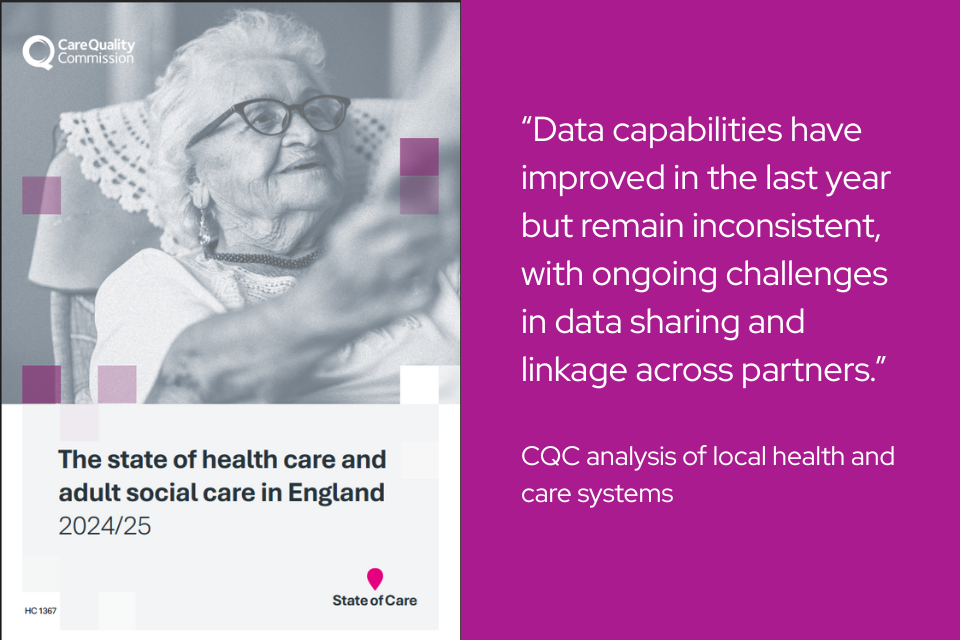
October 24th 2025
The Care Quality Commission’s (CQC) State of Health Care and Adult Social Care in England 2024/25 report highlights that while progress is being made in the use of data and technology, many of the long-standing challenges around information sharing and digital integration remain unresolved.
Across the health and care system, the regulator found that data is being used more effectively to identify need and target support – but that sharing it across organisational boundaries is still inconsistent and often incomplete.
Data-driven but disconnected
CQC reports that many integrated care systems are now taking a “data-driven, place-based approach to understanding local populations and their needs.” Some systems are “using data to proactively identify older and frail people who are at risk of falls and hospitalisation, and are providing targeted interventions.”
However, the regulator warns that progress is patchy. “Data capabilities have improved in the last year but remain inconsistent, with ongoing challenges in data sharing and linkage across partners,” it says in its analysis of local systems.
Local authorities are also reviewing their systems and revising their data processes to support prevention and discharge planning, but the ability to measure outcomes and impact remains uneven. One example describes how a council’s “data, as well as national data, showed that the support had enabled increased numbers of people to return home and remain at home.”
AI and digital access in primary care
In primary care, the report finds growing use of technology to support access and productivity. “Although over four-fifths of GPs we surveyed thought that AI will have a positive impact… less than half (42%) were using it,” CQC notes.
It also finds that “the proportion of video and online appointments has grown (5.5% in 2024/25 vs 0.6% in 2022/23),” reflecting a clear shift towards more digital channels. Yet as the government commits to going “‘digital by default,’ practices will need to minimise digital exclusion,” ensuring that those who prefer or need face-to-face support are not left behind.
The report links this digital change to wider reform, stating that “harnessing the advances in artificial intelligence (AI) is seen as one of the core elements of shifting care from analogue to digital,” with early examples of GPs using AI to reduce administrative workload.
Adult social care: digital maturity still developing
By contrast, the section on adult social care contains few direct references to data or technology. This suggests that, while many care services continue to digitise their records and use tools such as telecare, digital monitoring and falls sensors, this progress is not yet a prominent feature of national assessment.
CQC’s foreword also highlights the continuing challenge of system-wide information sharing, warning that “poor co-ordination between health and social care, inadequate information sharing, and a lack of digital integration is creating barriers to good care.”
Integration depends on trust, standards and investment
For the Digital Care Hub, the report’s findings underline the need for continued investment in the digital foundations of social care – not just technology, but the trust, standards and leadership that make it work across organisational boundaries.
Michelle Corrigan, Programme Director at Digital Care Hub, said:
“This report is another reminder that good data and technology alone won’t create integration – people will. We need shared confidence in how data is used, clear standards that make it easier to join up care, and ongoing investment so that social care isn’t left behind. Digital social care records, secure information sharing and strong cyber resilience are not optional extras; they are essential for safe, high-quality care.”
The CQC’s message is clear: progress on data and technology is being made, but inconsistently. Health and care services are experimenting with AI, digital access and data-driven decision-making, yet barriers to information sharing and uneven digital maturity continue to hold back the shift to genuinely joined-up care.
Related links
State of Care Report 2024/25 – CQC
View all News